Abstract
Pancreatic cancer has been increasingly diagnosed in the recent decades. Although the cornerstone treatment for pancreatic cancer is surgery, unfortunately, only 15-20% has a resectable disease at the time of initial diagnosis. Owing to the majority of patients having either locally advanced diseases or metastases, chemotherapy plays an important role in the management of pancreatic cancer. Because conventional chemotherapy has its limitations in the management of pancreatic cancer, recently developed molecular targeted therapy has emerged as an important modality of treatment of the disease. Drugs targeting growth factors such as epidermal growth factor and anti-angiogenesis have been studied and have promising results. Some of these drugs such as erlotinib have been already approved for the treatment of pancreatic cancer. Newer drugs such as those targeting hedgehog signaling pathway are now being tested. In this chapter, we will comprehensively review the current and also the latest development of anti-pancreatic cancer drugs.
Keywords: Angiogenesis, Chemotherapy, Growth factors, Molecular, Pancreatic cancer.






















